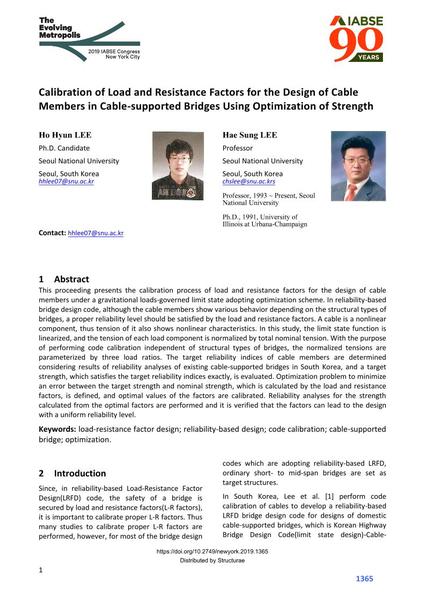Calibration of Load and Resistance Factors for the Design of Cable Members in Cable-supported Bridges Using Optimization of Strength

|
|
|||||||||||
Bibliographic Details
| Author(s): |
Ho Hyun Lee
(Seoul National University)
Hae Sung Lee (Seoul National University) |
||||
|---|---|---|---|---|---|
| Medium: | conference paper | ||||
| Language(s): | English | ||||
| Conference: | IABSE Congress: The Evolving Metropolis, New York, NY, USA, 4-6 September 2019 | ||||
| Published in: | The Evolving Metropolis | ||||
|
|||||
| Page(s): | 1365-1370 | ||||
| Total no. of pages: | 6 | ||||
| DOI: | 10.2749/newyork.2019.1365 | ||||
| Abstract: |
This proceeding presents the calibration process of load and resistance factors for the design of cable members under a gravitational loads-governed limit state adopting optimization scheme. In reliability-based bridge design code, although the cable members show various behavior depending on the structural types of bridges, a proper reliability level should be satisfied by the load and resistance factors. A cable is a nonlinear component, thus tension of it also shows nonlinear characteristics. In this study, the limit state function is linearized, and the tension of each load component is normalized by total nominal tension. With the purpose of performing code calibration independent of structural types of bridges, the normalized tensions are parameterized by three load ratios. The target reliability indices of cable members are determined considering results of reliability analyses of existing cable-supported bridges in South Korea, and a target strength, which satisfies the target reliability indices exactly, is evaluated. Optimization problem to minimize an error between the target strength and nominal strength, which is calculated by the load and resistance factors, is defined, and optimal values of the factors are calibrated. Reliability analyses for the strength calculated from the optimal factors are performed and it is verified that the factors can lead to the design with a uniform reliability level. |
||||
| Keywords: |
optimization cable-supported bridge reliability-based design load-resistance factor design code calibration
|
||||
